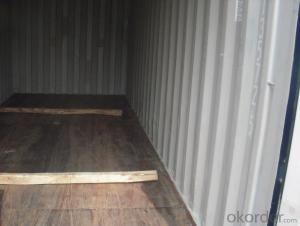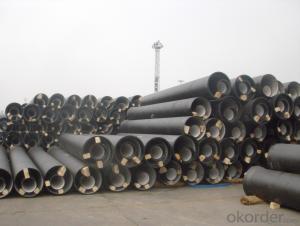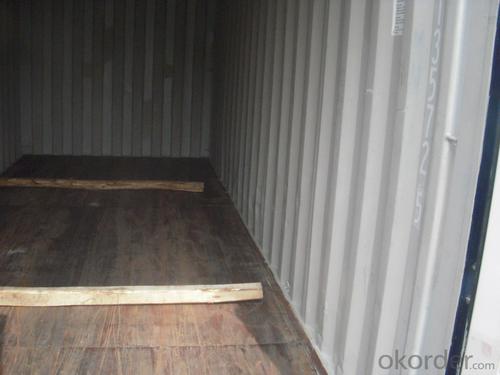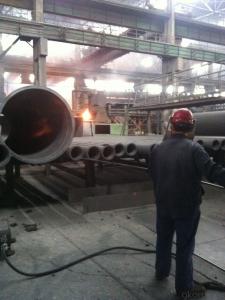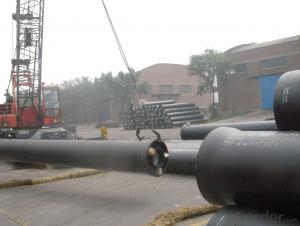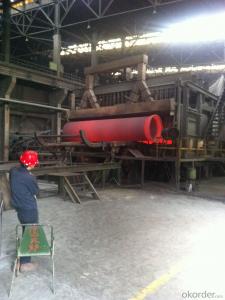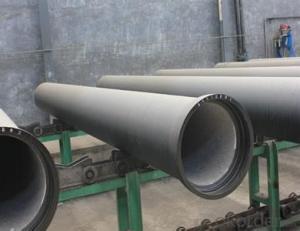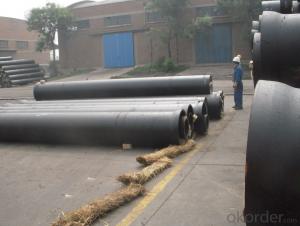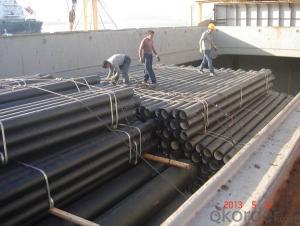DUCTILE IRON PIPE AND PIPE FITTINGS K7 CLASS DN1300
- Loading Port:
- Tianjin
- Payment Terms:
- TT OR LC
- Min Order Qty:
- 23 pc
- Supply Capability:
- 3000 pc/month
OKorder Service Pledge
OKorder Financial Service
You Might Also Like
· Material : Ductile Cast Iron
· Size Range : DN 80mm to DN 2000mm
· Unit Effective Length : 6m or 5.7m
· Manufacture Standard: ISO 2531:1998/ EN 545:2006/EN 598:2007
· Annual capacity : 200,000 tons
· Coating Exterior: Zinc 130g/m2 according to ISO 8179-1 and bitumen coating 70 microns.
· Cement Interior: Portland Cement/ High Alumina Cement/ Sulphate Resisting Cement Lining according to ISO 4179
· Special requirements on external coating and internal lining can be applied
· We also provide accessories such as SBR/EPDM rubber gaskets, lubricant paste, pipe caps, PE sleeves, etc.
Additional Parts:
Each pipe is strictly inspected according to related standard to ensure permanently high performance.
Easy Installation at site and service free for life
Long Service Lifespan
Quotation will arrive you within 24hours once we get your inquiry.
We guarantee offering you a competitive price.
A copy of original inspection reports of pipes will be offered after shipment.
Photos of loading process will be sent to the customer after shipment effect.
We will follow-up the delivery progress after shipment effect and update to the customer on weekly basis.
- Q: Can ductile iron pipes be used for mining applications?
- Mining applications can indeed utilize ductile iron pipes. These pipes possess exceptional mechanical properties, including high tensile strength, impact resistance, and durability. As a result, they are well-suited for a range of challenging environments, including mining operations. The pipes are capable of withstanding substantial loads and pressures, making them ideal for the transportation of water, slurry, and other fluids utilized in mining processes. Moreover, ductile iron pipes have a smooth internal surface that minimizes friction and promotes the efficient flow of materials. Consequently, they find extensive use in tasks such as dewatering, tailings disposal, and the transport of corrosive or abrasive substances within the mining industry. Overall, due to their strength, durability, and suitability for demanding conditions, ductile iron pipes offer a dependable and cost-effective choice for mining applications.
- Q: How do ductile iron pipes handle water hammer in high-rise buildings?
- Known for their durability and strength, ductile iron pipes are an excellent option for managing water hammer in high-rise structures. Water hammer, a common occurrence when water flow abruptly halts or changes direction in pipes, causes pressure surges that can strain and potentially harm the pipes. Engineered to withstand high-pressure scenarios, ductile iron pipes exhibit remarkable resistance to water hammer. With their high tensile strength, these pipes can endure sudden pressure changes without warping or fracturing. This feature is especially crucial in high-rise constructions where water distribution must accommodate various floor pressures. Furthermore, the outstanding corrosion resistance of ductile iron pipes bolsters their ability to handle water hammer. Over time, corrosion weakens pipes, making them more prone to failure during pressure surges. However, the corrosion resistance of ductile iron pipes guarantees their structural integrity even in high-pressure circumstances. Moreover, the flexibility of ductile iron pipes enables them to absorb and dissipate the energy generated by water hammer. Consequently, the overall system experiences minimal impact, reducing the potential for damage. Absorbing energy also contributes to minimizing noise and vibrations associated with water hammer, thus enhancing the efficiency and comfort of the water supply system. To summarize, ductile iron pipes are well-suited to manage water hammer in high-rise buildings. Their strength, corrosion resistance, and flexibility make them a reliable choice for delivering water under varying pressures while upholding the system's integrity.
- Q: What is the expected fire resistance of ductile iron pipes?
- The expected fire resistance of ductile iron pipes can vary depending on several factors such as the thickness of the pipe walls, the quality of the installation, and the surrounding conditions. However, generally speaking, ductile iron pipes have a high fire resistance due to their durable and heat-resistant material composition. Ductile iron is made by adding a small amount of magnesium to cast iron, which enhances its strength and flexibility. This makes ductile iron pipes less susceptible to cracking or breaking under high temperatures compared to other materials like PVC or HDPE pipes. In terms of fire resistance, ductile iron pipes can withstand high temperatures for an extended period of time without significant structural damage. They have been tested and proven to maintain their integrity in fire conditions for up to 2-4 hours, depending on the specific pipe design and installation. It is important to note that while ductile iron pipes have a high fire resistance, they are not fireproof. In case of a fire, it is crucial to follow proper fire safety protocols and consult with professionals to ensure the safety of the system and surrounding infrastructure.
- Q: Can ductile iron pipes be used in areas with high levels of organic matter in soil?
- Yes, ductile iron pipes can be used in areas with high levels of organic matter in soil. Ductile iron pipes have excellent corrosion resistance, making them suitable for various soil conditions, including those with high levels of organic matter. They are resistant to chemical attacks and offer long-term durability, making them a reliable choice for such environments.
- Q: How can 4 inch ductile iron pipe be connected with 2 inch galvanized pipe?
- Ductile cast iron used for more than 18 by adding nodulizer, after centrifugal ductile cast iron machine high speed centrifugal cast pipe, called "ductile" (Ductile Cast Iron Pipes), referred to as ball pipe, ductile iron pipe and ductile iron pipe etc.. The utility model is mainly used for conveying water, and is an ideal choice for tap water pipes.
- Q: Can ductile iron pipes be used for irrigation systems?
- Yes, ductile iron pipes can be used for irrigation systems. Ductile iron pipes have excellent strength and durability, making them suitable for a variety of applications, including irrigation. These pipes are resistant to corrosion and have a long lifespan, ensuring that they can withstand the harsh conditions often associated with irrigation systems. Additionally, ductile iron pipes have a smooth interior surface, which allows for efficient water flow and reduced friction loss. This makes them ideal for transporting water over long distances, ensuring proper irrigation of crops or landscapes. Overall, ductile iron pipes are a reliable and cost-effective choice for irrigation systems.
- Q: What is the external coating used in ductile iron pipes?
- The external coating used in ductile iron pipes is typically made of a protective material such as zinc or asphalt. These coatings are applied to the surface of the pipe to provide corrosion resistance and protect the iron from the surrounding environment. Zinc coatings, such as hot-dip galvanizing, are commonly used due to their excellent corrosion resistance properties. Asphalt coatings, on the other hand, provide a durable and flexible barrier against corrosion and abrasion. The choice of coating depends on factors such as the intended application, environmental conditions, and the specific requirements of the project.
- Q: How are ductile iron pipes protected against stray electrical currents?
- To safeguard water and sewer systems, ductile iron pipes are shielded from stray electrical currents through a technique called cathodic protection. This process entails the application of a low-voltage direct current (DC) to the pipes, generating a defensive electrical field around them. To achieve cathodic protection, sacrificial anodes or impressed current systems are installed near the ductile iron pipes. Sacrificial anodes, composed of a more electrically active metal like zinc or magnesium, are connected to the pipes and act as the electrical current source. Over time, these anodes corrode, sacrificing themselves to shield the pipes from corrosion caused by stray electrical currents. However, impressed current systems utilize an external power source to supply the protective electrical current. Rectifiers are employed to convert alternating current (AC) to direct current (DC), which is then administered to the pipes through anodes. This approach provides greater control over the amount of current applied, ensuring optimal protection. In both scenarios, the electrical current flowing through the sacrificial anodes or impressed current systems establishes a protective barrier around the ductile iron pipes. This barrier impedes the flow of stray electrical currents through the pipes, thus diminishing the risk of corrosion and prolonging the infrastructure's lifespan. Regular monitoring and maintenance of the cathodic protection system are crucial to uphold its efficacy. This involves inspecting the anodes, assessing the levels of electrical current, and making any necessary adjustments or replacements to maintain the desired level of protection. To summarize, cathodic protection is a dependable and widely utilized method for safeguarding ductile iron pipes against stray electrical currents. By preserving the integrity and longevity of water and sewer systems, it plays a vital role in ensuring their functionality.
- Q: What is the maximum allowable deflection for ductile iron pipes?
- Industry standards and guidelines, like those from the American Water Works Association (AWWA) and the Ductile Iron Pipe Research Association (DIPRA), typically specify the maximum allowable deflection for ductile iron pipes. These standards state that the maximum allowable deflection should be a certain percentage of the pipe's outside diameter. AWWA C150/A21.50 and DIPRA's Technical Bulletin No. 10 explain that the maximum allowable deflection for ductile iron pipes can vary depending on factors such as pipe size, wall thickness, and soil conditions. However, a general rule is that the maximum allowable deflection should not exceed 3% of the pipe's outside diameter. It is important to keep in mind that going beyond the maximum allowable deflection can lead to potential structural problems and reduced performance of the ductile iron pipe. Therefore, it is crucial to follow the industry standards and guidelines to ensure the proper installation and functioning of ductile iron pipes.
- Q: Are ductile iron pipes suitable for use in food processing plants?
- Ductile iron pipes are indeed suitable for use in food processing plants due to their numerous advantageous qualities. Firstly, they possess immense strength and durability, enabling them to withstand high-pressure situations. This feature proves crucial in food processing plants where pipes encounter diverse pressures during liquid and slurry transportation. Moreover, ductile iron pipes exhibit exceptional resistance to corrosion. This attribute becomes paramount in food processing plants as the pipes come into contact with various types of food, beverages, and cleaning agents, which can gradually corrode them. The corrosion resistance of ductile iron pipes ensures the pipes' integrity and safeguards the food products from contamination. Furthermore, these pipes display remarkable resistance to temperature fluctuations, rendering them suitable for the extreme temperature conditions often present in food processing plants. They can endure both hot and cold fluids without compromising their structural integrity. Additionally, ductile iron pipes possess a smooth inner surface, contributing to the maintenance of food product quality and purity. The smooth interior minimizes deposits like scaling or biofilm, thereby reducing the risk of bacterial growth. This quality proves essential in food processing plants where maintaining a hygienic environment is of utmost importance. Lastly, ductile iron pipes are easy to install and maintain. They boast a lengthy service life and require minimal upkeep, thereby minimizing downtime and associated costs in food processing plants. Considering these factors, ductile iron pipes emerge as a reliable and suitable choice for use in food processing plants. They ensure the safe and efficient transportation of fluids while meeting the industry's stringent hygiene and quality requirements.
Send your message to us
DUCTILE IRON PIPE AND PIPE FITTINGS K7 CLASS DN1300
- Loading Port:
- Tianjin
- Payment Terms:
- TT OR LC
- Min Order Qty:
- 23 pc
- Supply Capability:
- 3000 pc/month
OKorder Service Pledge
OKorder Financial Service
Similar products
Hot products
Hot Searches
Related keywords
